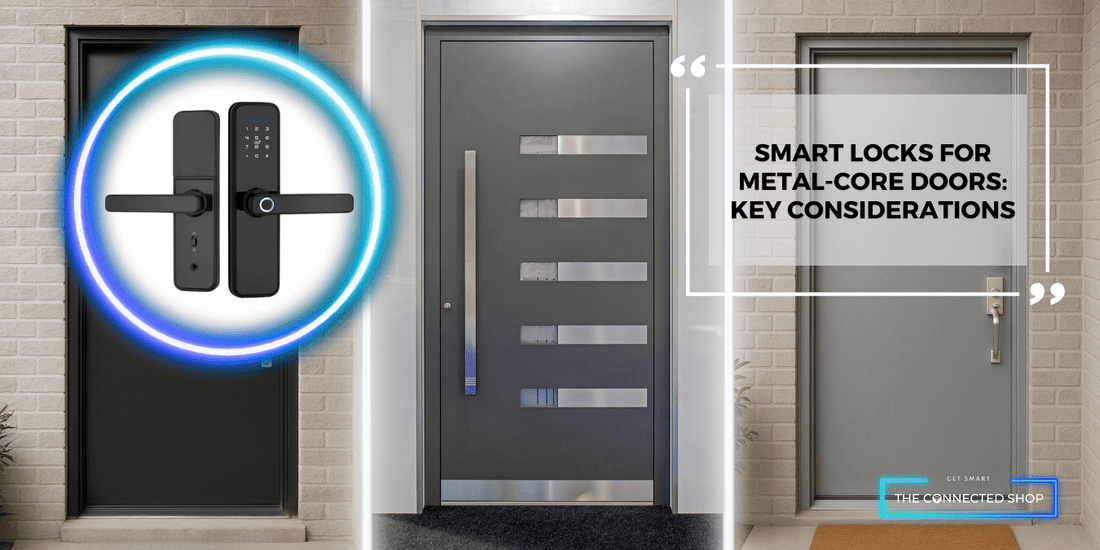If you’re thinking about upgrading to a keyless entry system, choosing the right smart door lock for a metal-core door is more important than you might expect. These doors are built tough, often reinforced with steel or other metal materials which makes them great for security, but also a little more demanding when it comes to installation.
Not all smart door locks are designed to handle the extra weight, density, or mounting challenges that come with a reinforced door. If the hardware isn’t up to the task, you might run into alignment problems, signal interference, or long-term wear that shortens your lock’s lifespan.
In this guide, we’ll walk you through the key things to consider when shopping for and installing smart locks for metal doors, from choosing the right model to knowing when it’s worth calling in a pro. If you’re a homeowner, renter, or installer, this article will help you get it right the first time.
What Makes Metal-Core or Steel Doors Different (and Why It Matters for Smart Door Locks)
When it comes to durability, metal-core and steel doors are in a league of their own. Designed with security and strength in mind, these doors typically feature a reinforced metal core often made of solid steel or a composite metal layer giving them superior resistance to impact, prying, and weather compared to most standard entryways.
But that strength comes with trade-offs, especially when you’re installing smart locks for metal doors. Unlike hollow or soft-core doors, metal-core doors offer little flexibility during installation. Drilling must be precise, hardware must be heavy-duty, and mounting surfaces are often harder to modify or adjust.
What’s more, some smart door lock components like wireless sensors or keypad modules can perform differently when attached to dense metal surfaces. Signal interference, misalignment, or even hardware fatigue can result from using locks not specifically designed for steel or metal-reinforced doors.
That’s why choosing a smart door lock that’s built with these doors in mind isn’t just recommended, it’s essential. In the next section, we’ll look at what features to look for when selecting smart door locks compatible with metal-core doors, so your upgrade is secure, reliable, and built to last.
How to Choose the Right Smart Lock for a Metal-Core or Steel Door
If you’re looking for a lock that’s truly built to handle the demands of a reinforced door, our Smart Door Lock is one of the best smart locks for metal doors. It’s designed specifically for strength, signal stability, and a clean, professional fit, no guesswork, no compromises.

Not all smart locks are built with metal-core or steel doors in mind and choosing the wrong one can lead to mounting headaches, weak performance, or even long-term wear on both the door and the lock. To get a secure and reliable setup, it’s important to look for features specifically suited to the toughness and rigidity of reinforced doors.
Make Sure It’s Designed for Metal Surfaces
Steel and metal-core doors are much tougher to work with than wood. You’ll want a smart door lock that’s tested and proven to work on metal doors; this helps ensure a secure fit and smoother installation. Check manufacturer specs or product listings for compatibility with steel or reinforced doors.
Use the Mortise Included with the Smart Door Lock
Most smart door lock kits come with their own mortise and for metal-core or steel doors, it’s usually best to use the one provided. This helps ensure that the lock body and the internal mechanism are perfectly aligned and compatible with the lock’s design. Swapping in a different mortise or trying to retrofit an existing one can lead to issues with fitting, function, or even long-term reliability.
Consider Signal and Sensor Performance
Because steel and metal interiors can interfere with wireless signals, it’s important to choose a smart door lock that maintains stable Bluetooth or Wi-Fi connectivity even on metal doors. Some locks include modular Wi-Fi bridges or gateway to improve signal reliability.
Choose a Lock Built for Heavier Use
Reinforced doors often carry more weight and see more wear at the hardware level. That means the smart door lock needs to be sturdy enough to withstand repeated use on a rigid surface. Lightweight plastic housings or fragile internal motors may wear down faster. Look for locks with solid construction, durable components, and proven reliability.
Here’s a look at our Smart Door Lock installed on a steel door, smooth performance, modern design, and a secure fit you can count on.
Why Professional Installation Matters for Smart Locks on Metal-Core Doors
Installing smart locks for metal doors might seem like a straightforward job but with these reinforced doors, even a small mistake can lead to major issues. These doors aren’t just harder to drill into; they’re also far less forgiving when it comes to alignment, fitting, and long-term wear. That’s why professional installation isn’t just a nice-to-have, it's often the smartest move you can make.
Precise Drilling Is Critical
Steel doors require specialized tools and experience. Drilling into a metal-core surface takes accuracy, or you risk damaging the door, misaligning the lock, or weakening the structure. A professional installer will have the tools and the know-how to create clean, accurate cuts without compromising the door’s integrity.
Correct Mortise and Lock Body Fitment
Even when using the mortise that comes with your smart door lock, fitting the lock body securely into a steel or reinforced core requires careful handling. If the fit is off by even a few millimeters, it could cause the lock to stick, bind, or wear unevenly over time. A pro can ensure the mortise sits flush and aligned for smooth, reliable operation.
Wiring, Connectivity, and Calibration
If your smart door lock includes wired components, a keypad, or a gateway bridge, installation can get even more technical. And for wireless locks, metal can interfere with signal strength if placement isn’t optimized. Professionals know how to test, calibrate, and position components to ensure consistent performance and connectivity.
Time-Saving and Peace of Mind
Finally, bringing in a pro saves you time and possibly repair costs later. You’ll know the lock is installed correctly, that the door hasn’t been compromised, and that your smart door lock is ready to perform exactly as it should from day one.
That said, if you're comfortable with tools and have experience working with steel doors, installing one of today’s smart locks for metal doors yourself isn't out of the question. Just make sure to follow the manufacturer’s instructions closely, take your time with alignment, and double-check that all components are secured properly. Done right, a DIY install can be just as effective as a professional one.
Final Thoughts
Fitting a smart door lock to a metal-core or steel door isn’t your average home upgrade, it’s a project that demands the right hardware, the right approach, and sometimes, the right professional touch. These reinforced doors offer unbeatable strength and security, but that toughness means smart door lock installation has to be handled with precision.
By choosing a smart door lock that’s specifically designed for metal-core doors, using the included mortise, and taking the time to ensure proper alignment and signal performance, you can avoid the most common pitfalls and get a smart door lock that performs flawlessly from day one.
No matter if you bring in a pro or handle the job yourself, the key is preparation. With the right tools, planning, and lock design, your upgrade won’t just be smart, it’ll be built to last. And if you’re looking for a lock that checks all the boxes, our Smart Door Lock is one of the most reliable solutions for metal-core doors, designed with strength, stability, and effortless functionality in mind.




